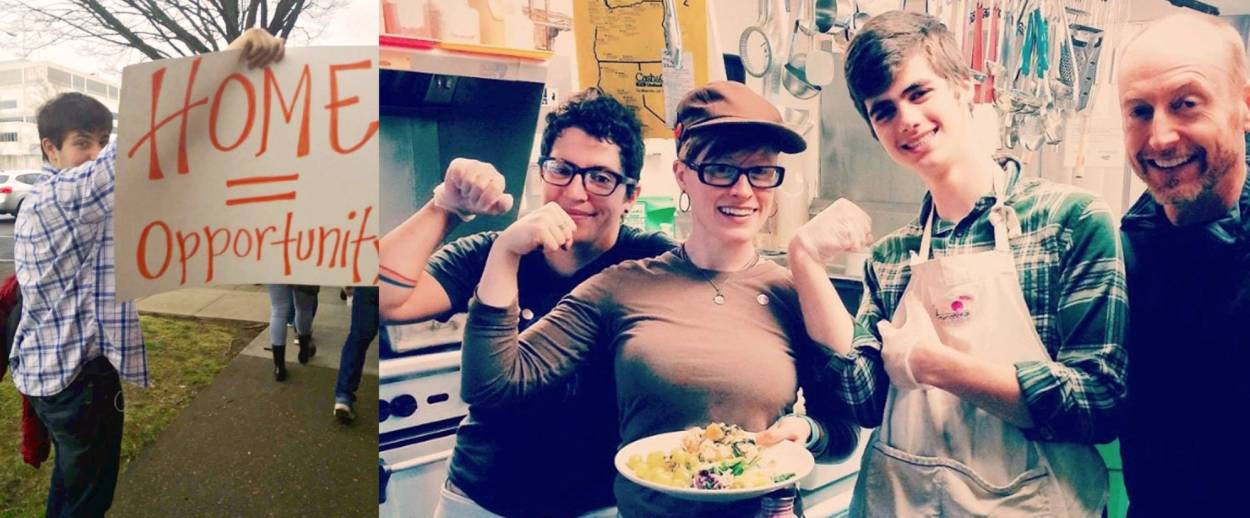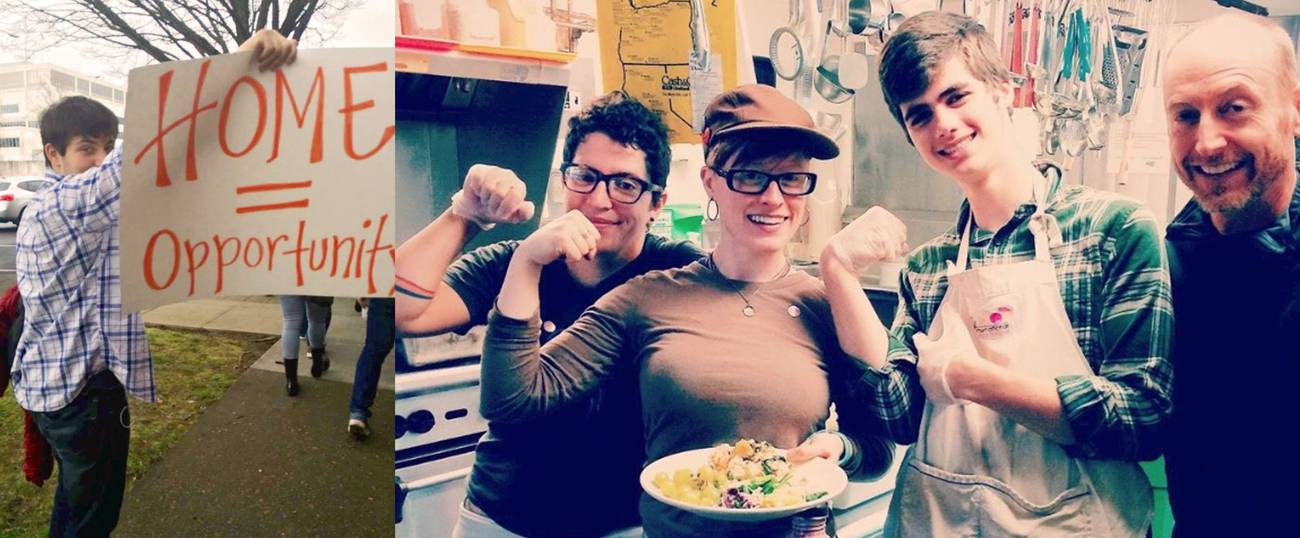Building Social Justice in the Pacific Northwest
In Portland, a gap-year program for high-school graduates connects Jewish learning and community service




Portland, Oregon, is hardly known as a hotbed of Jewry. There are synagogues of every stripe and even a de facto Jewish neighborhood (or at least an area where many Jews choose to live). But whereas on the East Coast or in Los Angeles Jews are such a known commodity that we hardly warrant mention, Jews in Portland—while present—are often overlooked or ignored.
All of this might make Portland seem like an unlikely location for a Jewish gap-year program for students taking time between high school and college. But that’s exactly why Steve Eisenbach-Budner decided to start Tivnu: Building Justice here. “On the East Coast, you’ve got a Jewish thing that happens almost through osmosis,” he told me. “But you’ve kind of got to take the bull by the horns if you want to lead a Jewish life in Portland. Tivnu didn’t have to be Jewish, but I wanted it to be public, loudly identified as people working in the world as Jews but not just for Jews.”
This kind of thinking is a logical extension of what’s long guided Eisenbach-Budner as both a Jew and an activist. He moved back to the United States from Israel because he felt that this was where he could be of more help “teaching people how to be strong Jews.”
“Tivnu is a great asset because it really encapsulates the Portland ethos. We’re a community that embraces creative, do-it-yourself Judaism,” said Marc Blattner, president and CEO of the Jewish Federation of Greater Portland. “We celebrate both historical institutions and embrace the new. And Tivnu, which engages young adults in both Jewish learning and community service, is part of that new.”
***
Since 2014, Tivnu has brought 15 high-school graduates to Portland from cities across the country and, so far, one from Israel. The organization has partnered with 20 organizations, with which Tivnu participants work over 30 hours a week in an internship capacity while living in a group setting and overseeing all the responsibilities that come with that. These students not only do community service with groups like Sisters of the Road and the Pineros y Campesinos Unidos del Noroeste while exploring their religion and culture, they also examine the intersection of Jewish identity and social justice.
For Eisenbach-Budner, it’s hard to separate the two. He’s devoted his life to social justice and feels that his values are derived from his background: “The fact that we were oppressed all these years means we had to take care of each other,” he said. “I still carry some of that intense feeling with me. But everybody has to survive. Jews should not only take care of each other. We should be trying to take care of everyone who needs it.”
Eisenbach-Budner wants Tivnu to be “a strong Jewish voice in the world,” but for him what that means—and what it means for the teens who enroll in the program—is a complex matter. For him, the link between social justice and Jewish identity is very real. Jewishness, though, is hardly a straightforward proposition. Tivnu places equal emphasis on both religious practice and texts and on what Eisenbach-Budner describes as “the lived experience of Jews.”
“The Jewish past is a resource for strength and for moving forward in the world,” he said. “There’s the history of Jews in the labor movement. There’s the Jewish involvement in the civil rights movement. But there’s also experience from a long time ago. Not just religious texts but how Jews tried to make the world into a place that these texts were proposing.”
This idea is drawn directly from Eisenbach-Budner’s own upbringing. In New York, he grew up in the Penn South Mutual Redevelopment Houses, a place he said was “regularly visited by documentarians interviewing 90-year-old former anarchists.” At the same time, he had Orthodox relatives and a grandfather who was a Hasidic rabbi. These strains of Judaism may not always happily co-exist or even overlap, but for Eisenbach-Budner both are essential for giving Tivnu’s participants a full sense of what it means to be a Jew and how this affects social justice work.
When it comes to service, Tivnu focuses on both theory and practice. Eisenbach-Budner himself “came from a real intellectual place, a real ideological, philosophical, leftist place,” he said. “It took me a while to realize that that work on the ground does matter.” That’s why the program makes a point of doing with Eisenbach-Budner describes as “the messy, dirty work.” He believes that this not only makes the work more impactful, but can also raise the level of awareness of exactly what’s being done and why: “Our internships involve working alongside people, like at Sisters of the Road. It’s important that our kids are actually meeting people and learning about their humanity. When they encounter them week after week, you come to see people as human.”
But there’s an added layer to what Eisenbach-Budner wants Tivnu’s kids to take away from their time in Portland, one more in line with his own more cerebral streak. For instance, while working for Habitat for Humanity, they spend time with an Urban Studies professor who breaks down the “nuts and bolts” of the macroeconomics behind the housing problem in America. “My goal is that by the end of the year, they’re looking at everything critically,” said Eisenbach-Budner. “A big piece of Tivnu is not just the work but what happens when you take a deep look at things. That’s the social justice part of things.” It’s also, in a broad sense, another link Tivnu makes between awareness and Jewish responsibility and accountability, at least if you believe that critical thinking is at the heart of so much Jewish praxis—in both religious and secular settings.
Internally, Tivnu is Jewish to its core. But there’s the larger question of what it means to be a Jewish presence in a place like Portland—or if anyone even notices. “People may appreciate and recognize that we are a Jewish organization,” said Eisenbach-Budner. “Mostly they’re just happy to have a volunteer group that’s coordinated and organized.”
“I have found Tivnu wonderful to work with. They’re really reliable and genuinely excited about our mission,” said Shannon Cogan, the community engagement co-manager at Sisters of the Road. “The three interns we had this past year were always willing to be flexible and asked about what the organization needed.”
But there are practical considerations that arise when dealing with some partners, logistical concerns that might be new to groups in the Pacific Northwest.
“It also comes up with, say, Shabbat,” said Eisenbach-Budner. “Volunteer days are usually on Saturdays, not Sundays. That may not really sink in with some places. If it’s important, we’ll try and push them, or not partner. To work with us, an organization has to really get it. There just needs to be that awareness of us as a Jewish program.”
Still, there’s no doubt that Tivnu’s public profile makes a statement about Jewish values and the role some Jews want to play in their larger communities. Eisenbach-Budner said he “didn’t do this to promote Jewishness.” He’d prefer to let the organization’s actions speak for themselves, since—echoing an underlying premise of tzedakah—“walking the walk is a better way to make the point than talking the talk.” But as he wryly puts it, “Tivnu is our name. That’s enough.”
Tivnu—whose name is Hebrew for “build”—is quite explicit in its mission to make the world a better place. But Eisenbach-Budner feels like there’s still more that could be done. He points specifically at what he calls “the tension between service and advocacy.” It’s one thing to ask someone to devote time and energy to a good cause or to enlist a student to do so. It’s another to take a position on an issue and fight to see it realized in the world. That’s a direction Eisenbach-Budner would like to see Tivnu address: “I would like Tivnu to be a stronger voice in the social justice world and not be afraid to take stances on things. The larger structural issues lead directly into advocacy. Learning about all this stuff they’re more likely to be involved in it. But they would have to drive that. Tivnu kids have participated in rallies in the past by choice.”
But for now, Tivnu is providing young Jews with a comprehensive and eclectic sense of their heritage. “If anything I think I’ll be more involved in the Jewish community because I can always connect [the tradition] back to what I did here,” said Sam Cohen, who is headed to Brandeis University this fall after recently completing the program. “If I’m reading a translation to a prayer, I can remember how our program director tied it to social justice. And whenever we were doing a social project or volunteer work, it was always connected back to Judaism.”
Tivnu is making a strong statement about the commitment of Jews to charitable causes and the strong, almost historic, ties that bind these two things—in the Pacific Northwest, no less. “It’s a good thing that people know Jews are out there doing good things,” said Eisenbach-Budner. “And I don’t think we can disentangle that idealism from the Jewish part of this at all.”
***
Like this article? Sign up for our Daily Digest to get Tablet Magazine’s new content in your inbox each morning.
Bethlehem Shoals is a founding member of FreeDarko.com. He has contributed to GQ, Salon, and Slate. Follow him on Twitter @freedarko.